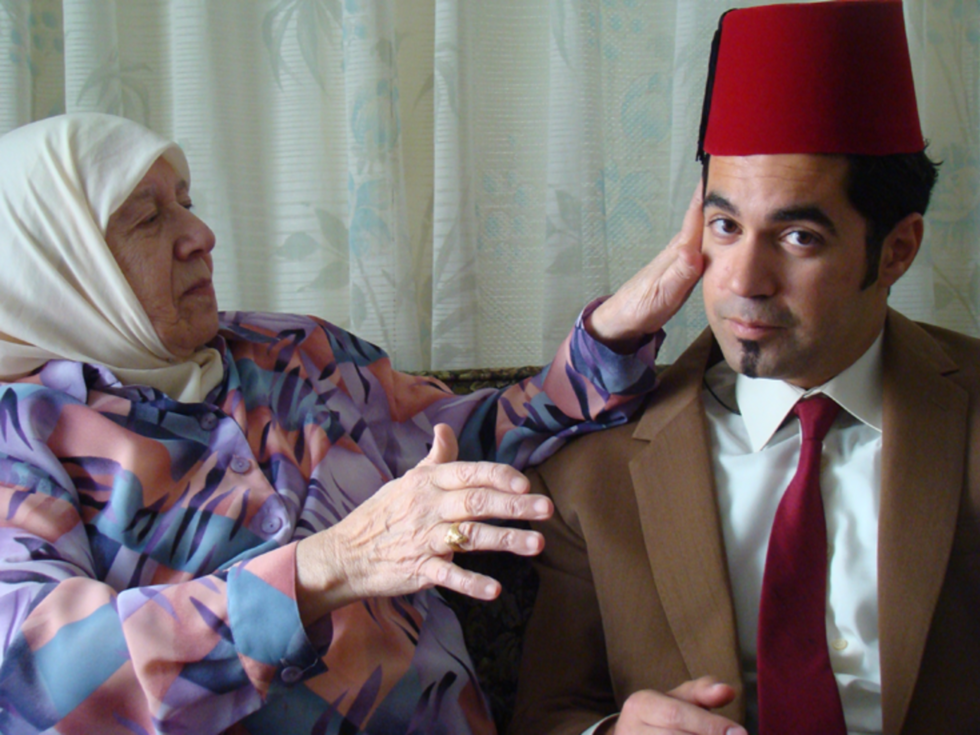
BY MAHMOUD KAABOUR |
Tribeca Takes: Mahmoud Kaabour
The TFF 2011 doc Grandma, A Thousand Times plays this week at the IFC Center. The director talks about the woman who inspired his film.

Don't miss your chance to see Grandma, A Thousand Times, which has played at both the Doha Tribeca Film Festival and the Tribeca Film Festival in New York City. This incredibly thoughful and heartful documentary is Lebanese filmmaker Mahmoud Kaabour's tribute to his beloved grandmother, aka Teta Fatima.
Update 5.7.12: Watch Grandma, A Thousand Times on iTunes.
Grandma, A Thousand Times follows Teta, the 83-year-old matriarch of the Kaabour family, who rules the neighborhood of the the old Beirut quarter she calls home. Teta is as endearing as she is fascinating a subject. She is illiterate but quick-witted, deftly haggles vendors for the best prices, drinks coffee by the gallon, and smokes unabashedly from a hookah. Teta is a living reminder of a time that has long since past.
We recently spoke to Kaabour—who directs and appears in this playful, magic-realist documentary—about the inspiration behind his film, the festival scene, and of course, Teta herself.
Tribeca: Please describe Grandma, A Thousand Times in your own words.
Mahmoud Kaabour: I guess the film set out to be a commemorative portrait of the queen bee of our family. But with her being so feisty and aware of the process of filmmaking, and me, a favorite grandson who resembles her deceased husband, the film became a depiction of our extraordinary, sometimes shocking, dynamic.
Tribeca: What inspired you to tell this story?
Mahmoud Kaabour: Before leaving Beirut to study film in Canada, I nicked a random audio tape from my grandparents' room as a souvenir from the place where I grew up. I later discovered that it contained seven violin Taqaseems (improvs on Arabic scales) recorded by Grandpa in his last years of life in that same room. His musical remnants and the hiss of Beirut’s alleys around his noodling haunted me for years.
A decade later, I decided to confess my discovery to Grandma in a filmed session that became the impetus of the film. Agitated, Grandma continued to tell stories of the man she loved to my camera over four full seasons, inadvertently exposing her own larger-than-life character as she copes with a silence of a once buzzing house. Meanwhile, I labored to invoke him personally, in her life and on screen.
Tribeca: You've traveled to festivals all over the world with this film. What has surprised you the most about the way audiences react to your grandmother?
Mahmoud Kaabour: I remain stunned by how consistent the feedback has been all over! Be it in Rotterdam, NYC, Buenos Aires or Abu Dhabi—people react on cue with chuckles and sniffles sounding at the same exact moments. Perhaps grandma Fatima embodies a universal character that transcends ethnic particularities.
Tribeca: What do you think New York audiences will take away from the film?
Mahmoud Kaabour: A slice of Middle Eastern family life—soaked in love, unique displays of affection, local dishes, and heart-wrenching music. Warning: the film is devoid of any political messaging and does not assume a stance on Arab revolutions or the Arab-Israeli conflict.
Tribeca: What have you learned about yourself—either personally, or as a filmmaker—through making this film?
Mahmoud Kaabour: Working with Grandma has shaken my seat of security behind the camera. She kept on yanking me to her sofa during interviews and reciprocated with questions of her own, taking the film off course and into the family portrait it has become. I surrendered to the manifestation of her late husband in my features and played along: donning his suit and fez at times and mimicking his quirks in others. It was eerie, effective narratively, and an exercise in mourning the dead man whom we both miss.
Tribeca: What does your grandmother think about the film, and about all the awards you've won? How about other family members?
Mahmoud Kaabour: Despite her illiteracy, Teta poetically described the film after seeing it the first time as “similar to being in heaven and staring down at my life.” But that came moments after she slapped my face for including her foul curses in a scene. She’s been meekly telling her neighbors about walking the red carpet and meeting Robert De Niro and Arab stars at the world premiere at Doha Tribeca, and she hasn't had to pay for her potatoes since. Teta was joyous about the first Audience Award, but struggled to grapple with the significance of later awards. “Are you getting rich?” she keeps asking me. She also questions my wits every time I say, “Not quite.”
Tribeca: What's up next for you? Will you continue to make documentaries?
Mahmoud Kaabour: I guess so, but only as long as challenging the documentary form is possible. My next film, The Champ of the Camp, follows contestants in a Bollywood singing competition, who are also members of the labour community in the UAE. I hope they will conspire with me, like Grandma did, to depict their cathartic love of music with the a lyrical twist.
Watch Grandma, A Thousand Times on iTunes.
Grandma, A Thousand Times: official site, Facebook.
To read a review on Grandma, A Thousand Times, visit the New York Times.
Watch the trailer:


